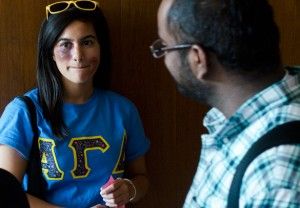Black eyes refuse to turn other cheek

October 24, 2012
Abuse victims will often conceal facial injuries, but students took a stand by bearing bruises Wednesday.
Women applied makeup to their face and eyes to simulate what someone looks like after being abused. Sheila Frampton, a domestic violence legal advocate for the Women’s Center, said the Black Eye Awareness Event took place to raise domestic violence awareness.
Frampton said many domestic abuse cases can go overlooked or get handled in an inefficient way, but the issue can be faced head-on with more exposure.
Advertisement
There has been more than 500,000 service hours provided to abuse victims within a year in Illinois alone, Frampton said, and this event helped point victims to professionals who want to help.
“Education and prevention are key to ending violence,” Frampton said in an email. “The Women’s Center offers public education and prevention programs on many topics related to domestic violence and sexual assault/abuse.”
Wendy Weinhold, coordinator for the LGBTQ Resource Center, said the Women’s Center is not the only option for abused partners, and her resource center also spreads knowledge on the subject.
“The LGBTQ Safe Zone training does touch on issues of power and oppression, which are at the heart of domestic abuse,” Weinhold said. “I absolutely believe these issues should be discussed more and more openly because we improve our world when we work to end violence.”
She said the Black Eye Awareness Event gave students the opportunity to talk about this problem outside the classroom.
“Educational opportunities are not limited to classroom interactions, and this event offers the campus community an opportunity to engage in dialogue about an issue that leaves its victims voiceless,” Weinhold said. “This is an opportunity for the campus to join together and voice our concern and care for people who need our support.”
Frampton said the Women’s Center offers training to identify whether someone is in an abusive relationship, how to prevent getting into one that could be abusive and what to do in a dangerous situation.
Advertisement*
She said people should recognize a violent relationship’s cycle.
She said it consists of highs and lows where the victim can feel at ease at times despite being physically or emotionally hurt at others.
Proper knowledge and understanding can break this cycle, Frampton said, and victims can safely remove themselves from the situation.
Frampton said there are also different forms of abuse besides physical. Other forms include financial, mental and sexual, she said, and can be achieved through dominance, isolation, guilt, threats and denial tactics.
A related event called, Walk a Mile in Her Shoes, will take place at 6 p.m. Friday, when women will march from Shryock Auditorium to the city pavilion for the same cause.
Jacob Rose, Walk a Mile in Her Shoes coordinator, said the event is important to him because it upholds people’s rights and explores an issue that affects many lives.
“Domestic Violence is a very important issue because this issue is a violation of the right we all have to live healthy, supportive, and happy relationships,” Rose said. “Domestic Violence doesn’t just affect women, but men, adolescents, and children, as well.”
The Women’s Center offers a 24-hour crisis hotline that can be reached at 529-2324.
Andy Morgan, director of Greek life, said the university also offers Saluki Cares, a network of faculty, staff, parents and other students who can report abuse cases so problems can be dealt with quickly and privately.
Advertisement







